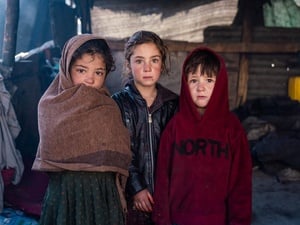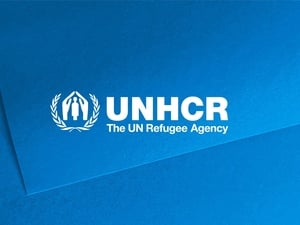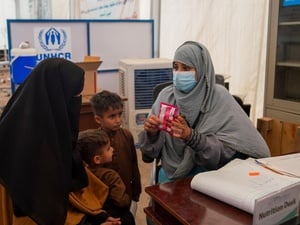UNHCR increasingly concerned about Iranian Kurds on Iraq/Jordan border
UNHCR increasingly concerned about Iranian Kurds on Iraq/Jordan border
UNHCR is growing increasingly concerned about a group of 102 Iranian Kurd refugees, including at least five pregnant women and a large number of children, who arrived at the Iraqi / Jordanian border in three batches over the past four weeks.
The refugees, who are from Al Tash - a long-standing refugee camp in Iraq - are on the Iraqi side of the border. They have not been permitted to enter Jordan, nor to join another group of 660 refugees - also mostly Iranian Kurds from Al Tash - who have been living in a camp in no-man's land between the two countries for the past year and a half.
UNHCR has been exploring with the Iraqi authorities the possibility of supplying them from the Iraqi side, not an easy option either. A mission is being planned by some health and migration officials who would take with them some basic relief items from UNHCR stocks in Baghdad.
UNHCR has also so far not been permitted to bring assistance across from the Jordanian side. We have been discussing two options - the issue of admission and the transport of assistance across the border - with the Jordanian government in Amman and via the permanent mission here in Geneva.
The refugees are believed to be surviving on the charity of passers-by - a situation that will clearly not be tenable for much longer. Weather conditions at the border have been very harsh in recent days, with freezing temperatures and strong winds, and the refugees are reported to be growing increasingly desperate. In addition to the women and children, there are believed to be some disabled and sick people among the group, but no medical team has been able to visit them so far.
Al Tash camp, which was set up more than 20 years ago, is currently housing just under 5,000 Iranian Kurds. Located around 60 kilometres from Fallujah and only 12 kilometres from Ramadi, the camp was badly affected by the heavy fighting in the area in the autumn.
Although no direct attacks on the refugees have been reported, the police station located in Al Tash was attacked in November. The previously well-provisioned camp also suffered sporadic cuts in its electricity and water supplies, medical care and educational activities. The chronic insecurity in this part of Iraq has also meant that UNHCR, its partners and the government authorities have been limited in their ability to respond to the refugees' needs - although the problems facing the camp's residents are not considered urgent at present. It should be stressed that, as a very well-established camp, it has become self-sufficient in many areas, and delivery of food aid has been continuing via the nationwide food-distribution system.
Last year, 3,120 people (around 600 families) moved from Al Tash to Sulaymaniyah in Northern Iraq, where they are receiving assistance from both UNHCR and the local authorities in the form of housing and income generation projects to enable them to achieve self-reliance.
UNHCR will continue to explore a range of options - including further relocations to Northern Iraq, or the return of those at the border to Al Tash. In the meantime, however, it will continue to impress on both the Iraqi and the Jordanian authorities that this group should, at the very least, receive some food and material assistance, as well as medical attention, without further delay.







